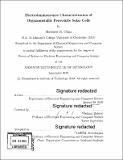Electroluminescence characterization of organometallic perovskite solar cells
Author(s)
Chua, Matthew R.(Matthew Ruiyan)
Download1142635027-MIT.pdf (10.74Mb)
Other Contributors
Massachusetts Institute of Technology. Department of Electrical Engineering and Computer Science.
Advisor
Vladimir Bulović.
Terms of use
Metadata
Show full item recordAbstract
In this thesis, I have studied the electroluminescence (EL) properties of photovoltaic (PV) devices based on "Organometallic Perovskites" which exhibit high power conversion efficiencies of approximately 23%. Aside from single-junction current-voltage characteristics, these devices exhibit low voltage light emitting diode (LED) operation with thermally activated sub-bandgap voltage turn on and efficiency roll-off occuring before the bandgap voltage. with a maximum electroluminescence quantum efficiency (LED-EQE) of appoximately 14%, with an energy conversion efficiency of 18%. Observation of the thermally activated reigme and high LED-EQE during a voltage sweep requires an unusually low sweep rate (<5mV / s), which is significantly slower than the acceptable rate for PV characterization (100mV / s). Pulsed drive experiments suggest that this discrepancy is strongly linked to ionic motion within the perovskite layer. From simultaneous photoluminescence-electroluminescence measurements, we find evidence that electroluminescence is not uniformly generated across the thickness of the perovskite layer. All these observations can be made consistent with a qualitative model that takes into account ionic motion in the perovskite under electrical excitation. The implication of these results is also discussed in the context of the utility of EL characterziation for perovskite PVs.
Description
Thesis: S.M., Massachusetts Institute of Technology, Department of Electrical Engineering and Computer Science, 2019 Cataloged from PDF version of thesis. Includes bibliographical references (pages 81-86).
Date issued
2019Department
Massachusetts Institute of Technology. Department of Electrical Engineering and Computer SciencePublisher
Massachusetts Institute of Technology
Keywords
Electrical Engineering and Computer Science.